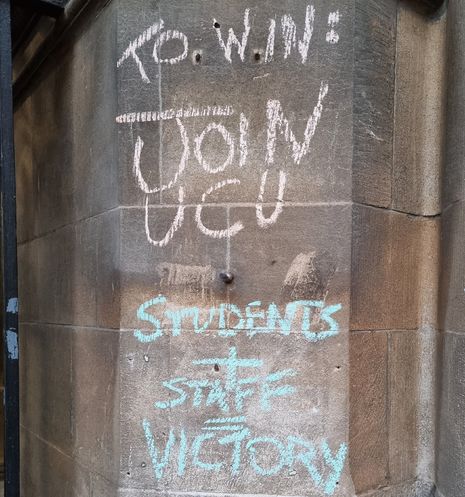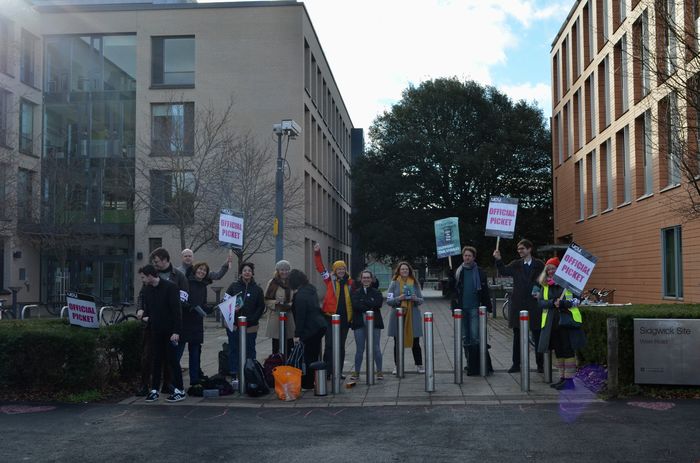Once again, the UCU strikes out
Deputy Opinion Editor Hugh Jones argues that rather than a display of solidarity, the UCU strikes are motivated by members’ self-interest at the expense of students and other staff

On Monday, the spectre of strikes returned to haunt Cambridge once more. The University and College Union (UCU) are downing tools in protest against plans to restructure the USS pension scheme, which aim to reduce the risk of the scheme running out of money in the future. They are also striking over what the UCU call their “four fights”: pay, workload, equality, and casualisation.
The UCU specify which days of strike action are in response to which disagreements; most are in response to pension reforms. But you aren’t going to hear about the USS, even during the initial five-day block of strikes which are solely focussed on it. You probably won’t even hear about the four fights. Instead, you will hear, non-stop, about supervisors and their exploitation.
“What the UCU are doing is an embarrassing cos-play”
Interpreted charitably, what the UCU are doing is an embarrassing cos-play, an attempt by fantasist academics to replicate the glory days of strikes in the 70s. Uncharitably, it is a cynical exploitation of supervisors’ misfortune to get taxpayer-subsidised (through tax-exempt status, if nothing else) universities forking out even more on fellows’ pensions.
The UCU talk about “unsafe workloads” as if staff were working themselves to exhaustion down mineshafts. The equality demand within the four fights means, apparently, a demand to close the gender and ethnic pay gaps, as if Toope has a magic button to end inequality which he is inexplicably refusing to press. The UCU throw around the word “solidarity” with such abandon that you could be forgiven for thinking that the Sidgwick site is a modern-day Victorian workhouse.
Here, the charitable reading of the strikes falters. You could see the UCU as simply suffering from the cognitive dissonance which stems from discussing anti-capitalist praxis over port in the SCR after a four-course candlelit formal. But the problem is that the UCU aren’t simply occupying a position which looks hypocritical. There is nothing wrong with speaking against injustice from a position of privilege, even if appropriating the rhetoric of genuinely working-class movements to do so is in decidedly bad taste.
If you look a little deeper, the UCU seems to be making a wide range of demands which play to left-wing students and staff, such as “a framework to eliminate precarious employment practises”, and the aforementioned end to gender and ethnic pay gaps, within which are nestled demands for more money for the UCU’s already privileged members – first among the UCU’s four fights is pay, and the solution is apparently a raise of £2500 on all pay points; the fight over the USS is solely about how much academics get paid.
The desire to earn more money is understandable, especially as inflation rises. However, using systemic inequality and the plight of supervisors to better spin a wholly self-interested campaign of disruption to our learning is shamelessly disingenuous. It also makes it ridiculous that our Students’ Union supported the strikes last term, and will in all probability support them this term.
“They take an actual injustice, like systemic racism, and use it as a smokescreen”
The UCU act like guardians of the downtrodden, whilst shamelessly covering for its privileged members. By contrast, our SU seems to do very little for its student members , replacing policy with leftist platitudes. This is best, and most sickeningly illustrated, by the UCU’s handling of Professor Gopal’s antisemitic attacks on writers for Varsity earlier this term. Rather than condemning her for implying that Jewish students were part of a media conspiracy against her, they issued a “statement in solidarity”, condemning “attempts to silence anti-racist action”. Anti-racist action is perhaps the most creative euphemism for antisemitism that I’ve ever heard, but this perfectly encapsulates how performative the UCU’s position is. They take an actual injustice, like systemic racism, and use it as a smokescreen to advance the interests of their members – Gopal is on the Cambridge UCU’s executive committee – even when doing so results in violating the very principles they claim to uphold. Meanwhile, the only support I’ve received from the SU since joining Cambridge last Michaelmas was when its president friended me on Facebook.
None of this is to deny that there is a real problem with supervisors’ pay. Whether it makes sense to regularise the contracts of postgraduates who are doing short-term work on the side to help fund their studies is a question for an Economics student, but I would probably support a pay-rise for supervisors to acknowledge the fact that most, if not all, are only paid for the work which takes place in the classroom, and thus does not include the hours of wider reading and marking which they must do. Nonetheless, as you have probably guessed by now, I have had no qualms crossing the rather unenthusiastic picket lines at Sidgwick site, because once you strip away the UCU’s misrepresentations, their case simply isn’t that strong.
The UCU like to obsess over the University’s money. The University is obviously very wealthy, and has apparently had good returns on its investments, but it is no business, it is a charity. Cambridge conducts life-saving medical research, is investing in technologies to combat climate change, and funds research into art, literature, and history, through which our society can come to understand itself better. Call me a scab all you want, but I think that the University’s resources would be better spent funding this research, especially the research done by PhD students, rather than on lining the pockets of fellows’ gowns.
 News / Uni Scout and Guide Club affirms trans inclusion 12 December 2025
News / Uni Scout and Guide Club affirms trans inclusion 12 December 2025 News / Cambridge Vet School gets lifeline year to stay accredited28 November 2025
News / Cambridge Vet School gets lifeline year to stay accredited28 November 2025 News / Cambridge study finds students learn better with notes than AI13 December 2025
News / Cambridge study finds students learn better with notes than AI13 December 2025 Science / Did your ex trip on King’s Parade? The science behind the ‘ick’12 December 2025
Science / Did your ex trip on King’s Parade? The science behind the ‘ick’12 December 2025 News / Pembroke to convert listed office building into accom9 December 2025
News / Pembroke to convert listed office building into accom9 December 2025








